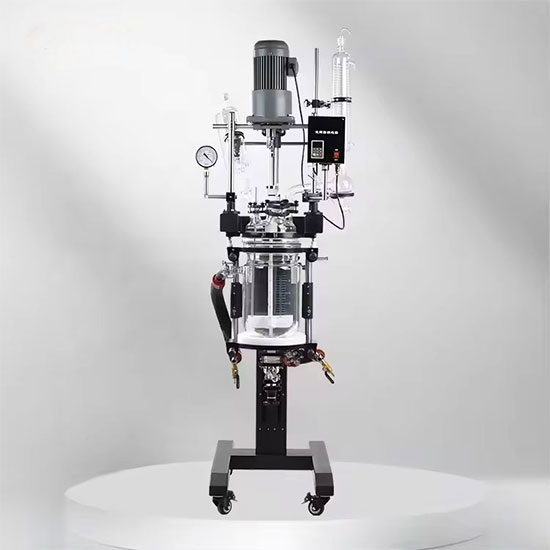Glass reactors are pivotal tools in modern laboratories, serving a variety of functions that support scientific research, quality control, and educational training. These versatile Laboratory Instruments are used for numerous applications, ranging from chemical synthesis to material science. In this essay, we will explore the critical role of glass reactors in different laboratory settings, emphasizing their importance in Quality Inspection Laboratories, University Research Institutes, School Experimental Equipment, Enterprise Experimental Equipment, and Research Facilities.
Key Features of Glass Reactors
Glass reactors are designed to provide a controlled environment for chemical reactions. They typically consist of a glass vessel, a stirrer, a heating or cooling jacket, and various ports for adding reagents and measuring parameters. The transparency of glass allows researchers to visually monitor reactions, ensuring precision and safety. These reactors come in various sizes, from small-scale laboratory units to large industrial reactors, making them adaptable to different research needs.
The ability to withstand high temperatures and corrosive chemicals makes glass reactors indispensable in a lab. They are often equipped with advanced control systems to regulate temperature, pressure, and mixing speed, which are crucial for achieving consistent and reproducible results.
Applications in Different Laboratory Settings

1. Quality Inspection Laboratory
In Quality Inspection Laboratories, glass reactors are used to test the quality and purity of raw materials and finished products. They play a crucial role in the chemical industry, where they help in the synthesis and testing of various compounds. By providing a controlled environment for reactions, these reactors ensure that the products meet industry standards and regulatory requirements.
2. University Research Institutes
University Research Institutes utilize glass reactors for advanced research and development. These reactors enable students and researchers to conduct experiments in organic and inorganic chemistry, biochemistry, and material science. The precision and control offered by glass reactors allow researchers to explore new chemical pathways, synthesize novel compounds, and study reaction mechanisms. This hands-on experience with sophisticated Laboratory Instruments is vital for training the next generation of scientists and engineers.
3. School Experimental Equipment
In educational settings, glass reactors are part of the School Experimental Equipment used to teach chemistry and engineering principles. These reactors provide students with practical experience in conducting chemical reactions, understanding reaction kinetics, and learning about process control. By working with glass reactors, students gain a deeper understanding of theoretical concepts and develop essential laboratory skills.
4. Enterprise Experimental Equipment
Enterprises involved in product development and manufacturing rely on glass reactors as part of their Enterprise Experimental Equipment. These reactors are used in the formulation of pharmaceuticals, development of new materials, and optimization of chemical processes. The ability to scale up reactions from the lab to production scale makes glass reactors an essential tool for industrial research and development. They help in improving product quality, increasing yield, and reducing production costs.
5. Research Facility
In specialized Research Facilities, glass reactors are used for cutting-edge scientific investigations. They support a wide range of applications, from environmental testing to the development of renewable energy sources. For instance, researchers might use glass reactors to study catalytic reactions, develop new polymers, or explore biofuel production. The versatility and precision of these reactors make them suitable for a broad spectrum of scientific endeavors.
Advantages of Using Glass Reactors
Glass reactors offer several advantages that make them ideal for laboratory use. The primary benefit is their chemical resistance, which allows them to handle a wide range of reagents without contamination or degradation. The transparency of glass enables continuous observation of the reaction process, which is essential for monitoring and adjusting experimental conditions.
Another significant advantage is the ease of cleaning and sterilization. Glass reactors can be thoroughly cleaned between experiments, ensuring that there is no cross-contamination of samples. This feature is particularly important in Quality Inspection Laboratories and Research Facilities, where the integrity of the data is paramount.
The precise control over reaction conditions provided by glass reactors is another key benefit. Advanced control systems allow for accurate regulation of temperature, pressure, and mixing, which are critical for achieving consistent results. This level of control is especially important in University Research Institutes and industrial applications, where reproducibility and scalability are crucial.
Conclusion
Glass reactors are indispensable tools in modern laboratories, supporting a wide range of scientific and industrial applications. Their versatility, chemical resistance, and precise control make them ideal for use in Quality Inspection Laboratories, University Research Institutes, School Experimental Equipment, Enterprise Experimental Equipment, and Research Facilities. By providing a controlled environment for chemical reactions, glass reactors enable researchers to conduct experiments with accuracy and safety, contributing to the advancement of science and technology.
As scientific research continues to evolve, the demand for reliable and sophisticated Laboratory Instruments like glass reactors will undoubtedly increase. Their role in ensuring product quality, advancing scientific knowledge, and training future scientists underscores their importance in the laboratory. Whether in academic, industrial, or educational settings, glass reactors remain a vital component of the modern laboratory toolkit.
Contact: Mr.Wen
Phone: +86 18650326308
E-mail: wencj@axmelec.com
Whatsapp:+86 18650326308
Add: No. 168, Zhaogang Road, Xiang'an District, Xiamen City, Fujian Province, China
We chat
